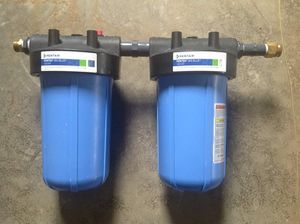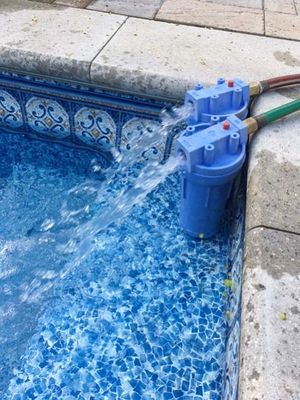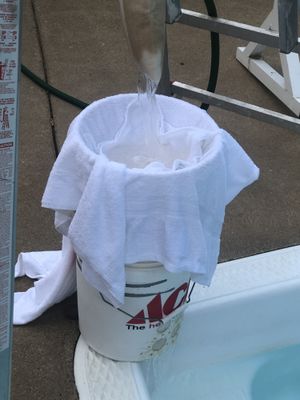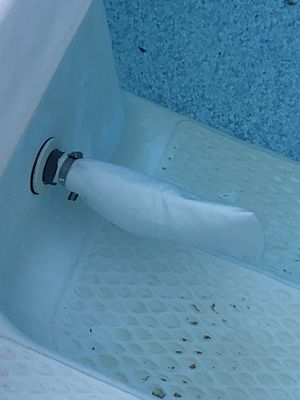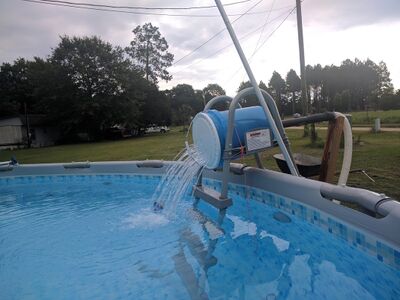Filtering Fill Water for Iron
Pool owner sometimes find that their fill water is putting iron into the pool water. Especially when the fill water is coming from a well. Iron accumulates in pool water and iron levels over 0.3 ppm can cause staining.
If the water coming from your well is quite clear, you will not get much help from ANY mechanical filtration. The soluble iron molecules are too small and pass right through most all mechanical filters.[1]
Now, if the iron in your water precipitates and becomes visible, then a mechanical filter, including your pool filter, can filter it out........unless, that visible iron sticks to your pool surfaces.
A mechanical filter can reduce the amount of iron getting into the pool from fill water but it will not eliminate 100% of the iron in the water.
Filters work in proportion to the amount of metal/iron they have to treat, so the pool consumables didn't seem like a great value or a permanent solution.
Visible versus Soluble Iron
Filtering visible iron does not necessarily remove iron from your pool. In fact, a normal pool filter is very likely capable of filtering out visible iron.[2]
The iron that causes most of our pool issues is iron in soluble form and passes right through mechanical filtration. Then, a combination of conditions can occur in your pool that allows that soluble iron to precipitate out onto your pool surfaces and it bonds tightly to those surfaces.........making removable quite difficult.
Filtering visible iron can be done mechanically. Soluble iron is not so easy and, generally speaking, will pass through any attempts at mechanical filtration.
Sequestrants keep iron in soluble form - preventing them from precipitating on your pool surface - but the iron is still there.
R/O treatments actually remove the soluble iron but they do so through mechanical filtration
Garden Hose Filter
Dual Pentek Big Blue Filters
Many garden hose water filters for hoses have a flow rate of 2 gpm. One member put together two Pentek 150237 #10 Big Blue Filter Housing in series with a Pentek WPX5BB97P 5 micron filter followed by a Pentek WP.5BB97P 0.5 micron filter with a flow rate of 10 gpm for his fill water.[3]
They screw on the end of a garden hose before the water goes into the pool. After filling the pool the filters are removed and dried in the sun to avoid any kind of mildew growth from wetness.
Pentek Whole House Filter with Dual Layers
Another member used a Pentek whole house filter on the end of a garden hose with the Pentek DGD-2501 spun polypropylene filter cartridge.
The Pentek DGD-2501 filter has 2 separate gradient layers. The nominal filtration rating of the pre-filter layer is 25 microns, and the rating of the post-filter layer is 1 micron. The filter is made of spun polypropylene fibers for resistance to chemicals and bacteria. It has an initial pressure drop of less than 1 psi at a flow rate of 10 GPM.
Pleatco PPS2100 Spa and Pool Sediment Filter Cartridge
Some members have used the Pleatco Spa and Pool Sediment Filter Cartridge connected to a garden hose to filter fill water. Pleatco says the filter has 3 layers and will filter down to 5 microns.[4] Iron needs 3 micron filtering but some member claim it has worked.
Green Sand Filters
Green sand is a sand material that is coated with manganese oxide. The iron containing water passes though the sand sieve and reacts with the iron dissolved in the water. The oxidized iron is then filtered. What comes out is supposed to be iron free, or pretty close. The technology has been around a long time but mainly used in water treatment plants.
There is a the concern that trace levels of maganese may build up and then stain the pool. Maganese is a problem in some pools, causing purple and black staining.[5]
MetalTrap Filter
The MetalTrap Filter is advertised to remove iron and copper from water before adding it to the pool.
A review of the MetalTrap filter found that it reduced 1.3 ppm iron in house water by about 50% to 70%. depending on the flow rate.
Green sand filters work better when you use a relatively large filter at a relatively slow flow rate. The higher the amount of dissolved iron, the more important both of those factors become.
Bucket and Biodiesel Filter
An creative member built a filter set up using 1 micron biodiesel filters and layered poly-fill stuffing pulled out of the cheapest wallyworld pillows, cotton dish towels and paper towels.[6][7]
You can get 1 micron biodiesel filters at DudaDiesel.
He used a similar process to filter water in the pool, adding the dish cloth and poly-fill into the skimmers, and bio diesel filters on returns.
Polyfill Bucket Filter
This thread describes how a 5 gallon bucket filled with polyfill was rigged to the pool ladder with some string, a couple dozen 1/4” holes drilled into the bucket, and a large hole drilled into the bottom of the bucket to filter a pool that did not have skimmers.
Filtering Iron Out of Pool Water
Read these threads:
- If you’ve got iron in your fill water, use Polyfill to remove it
- Money Pit is poop brown
- Does sequestrant mess with filtering out iron?
- From brown to thank you polyfill
.
- ↑ https://www.troublefreepool.com/threads/question-about-iron-in-fill-water.189404/post-1668532
- ↑ https://www.troublefreepool.com/threads/garden-hose-iron-filters.110557/post-978084
- ↑ https://www.troublefreepool.com/threads/garden-hose-iron-filters.110557/post-977217
- ↑ https://edc.poolsupplyworld.com/wpdf/pleatco-pps2100-user-guide.pdf
- ↑ https://www.troublefreepool.com/threads/filtering-iron-metal-out-of-water.111107/post-982584
- ↑ https://www.troublefreepool.com/threads/help-me-understand-the-iron-staining-process.189215/post-1666774
- ↑ https://www.troublefreepool.com/threads/money-pit-is-poop-brown.188831/post-1663803


